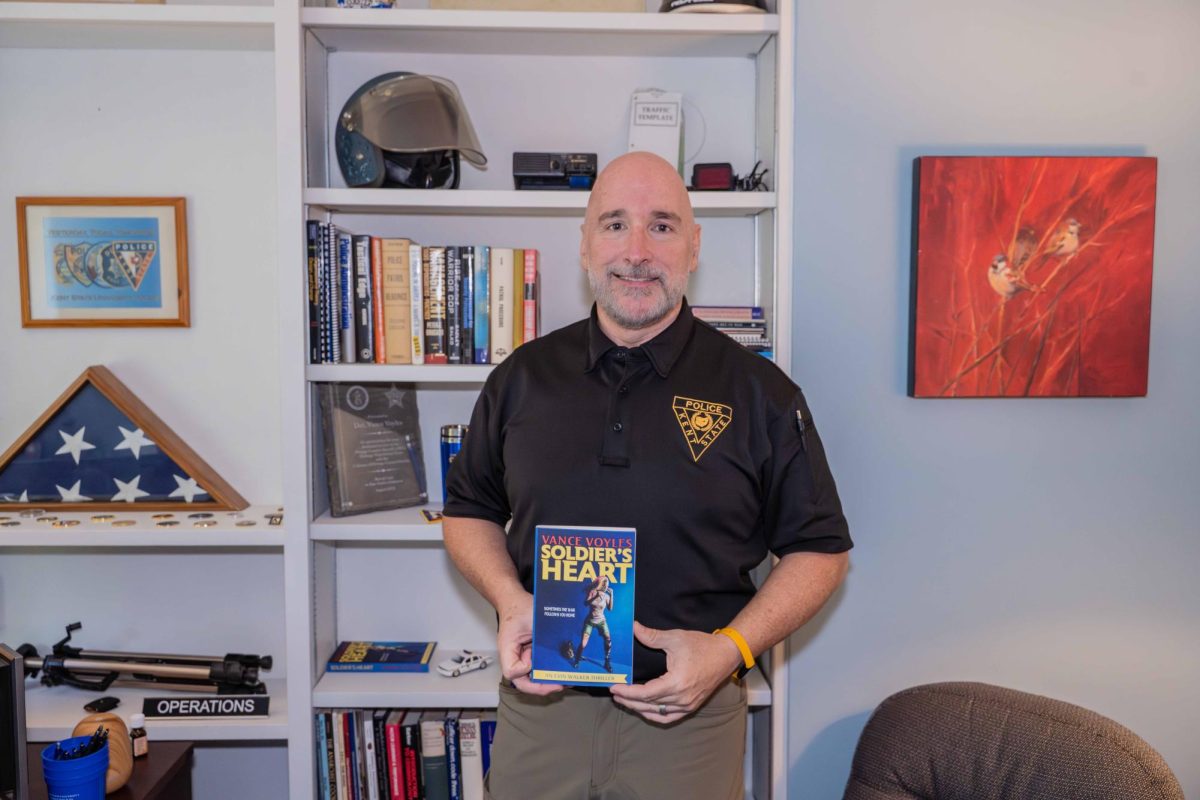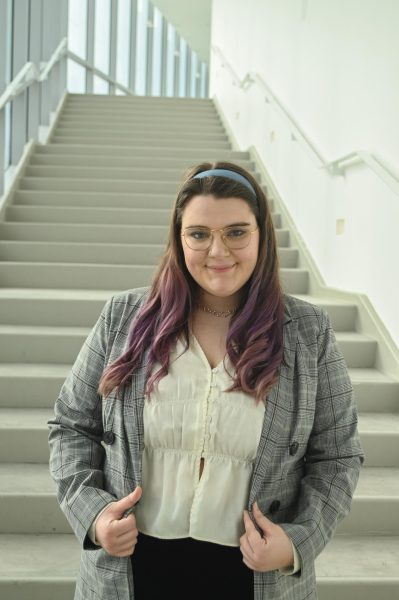Tranquility fills the office. Soft beats murmur from the speaker, a diffuser emits the smell of lavender and lemon and dim lights cast a calming glow. Behind the desk, a white bookshelf holds several copies of “A Soldier’s Heart” by Sgt. Vance Voyles.
Sitting at the desk is Voyles, a full-time Kent State University police sergeant, professor, screenwriter and author of “A Soldier’s Heart.”
The book is a fictional story about a female veteran who loses her leg in Afghanistan. After getting her life back on track after her incident, she comes across an incomplete application to a local Militia Group at her job. Investigating it sends her down a dark path.
What began as a 1,000-word short story grew into a 120-page script, which Voyles shared with actor Michael Keaton, a Kent State attendee in the 1970s and a friend. When COVID-19 shut down much of the film industry, Voyles adapted the screenplay into a novel.
Voyles has served as a police officer for 23 years, but that’s just one chapter of his story. Before policing, he spent seven and a half years in the military and later returned to college to pursue his passion for storytelling.
“I had a professor I really liked, and she just kept saying, ‘keep writing, keep writing,’ so I did,” Voyles said.
After leaving the military, he earned a bachelor’s degree in creative fiction and a master’s degree in nonfiction writing. During his studies, Voyles faced personal struggles and became a police officer to help people in a different way.
Voyles worked for 12 years in the sex crimes and homicide division in Orlando, where he had many good and difficult experiences.
Policing at Kent State is entirely different.
“My interactions with people when I was in Florida versus what they are now are much different. We are more student-centered. We’re about getting you through college, not through booking,” he said. “So, it’s not my main goal to put somebody in jail anymore. My main goal is to help you get through life. It’s a much different kind of policing. I like it here a lot better.”
Sgt. Tricia Knoles, who works alongside Voyles, shares a close friendship with him. They call each other the “Wonder Twins,” a nod to the ’80s cartoon, because they have swapped roles: Voyles is training to become the communications and outreach sergeant, while Knoles is moving into the public information officer role.
“He is a gift,” Knoles said.
One quality Knoles admires is Voyles’s ability to balance his demanding career with his family life.
“I think one of his greatest attributes is that he always makes time for his kids,” Knoles said.
She recalled when Voyles took a few days off to drive to New York to see a Broadway show with his daughter.
“It definitely is notable that, regardless of his career, his secondary job is teaching and then authoring, while also being in the mindset of working on writing a movie — he always makes sure to set aside time for his kids and make memories with them,” Knoles said.
In addition to his full-time role as a sergeant, Voyles teaches screenwriting for digital media production majors and continues to write creatively.
One of his screenplays has a personal backstory. About 10 years ago, Voyles received a Facebook message from someone asking if he had been an officer in Orlando in 2005. After some research, Voyles learned they had shared a professor in college, and that he had once saved the man’s life.
The two are still good friends, and Voyles is now writing a screenplay about the man’s mother, who was the first female scout for the NFL.
Voyles said his passion for storytelling comes from his personality and love for being at the center of a group, what he referred to as being “on,” telling a story to an audience.
At 19, he went on a motorcycle trip, and when he returned, he crafted the experience into a funny story to tell friends. That was when he realized how much storytelling meant to him.
Micah Beck, a former student in Voyles’ Story for Picture class, said Voyles encouraged students to experiment and take creative risks.
“He really encouraged us to look at things differently and try out new methods in writing,” Beck said.
He said Voyles’ teaching style made it easy for students to reach out to him with questions or ideas.
Ian Barter, a sophomore theatre design, tech and production major, had Voyles on his podcast, “Extra Credit,” through Black Squirrel Radio. Barter said Voyles showed up early, chatted beforehand and even gave him a copy of his book.
Barter learned that Voyles was an Arabic translator in the military and worked as a special crimes detective in Orlando.
“You can just learn a lot about life from him,” Barter said.
Voyles said the most important thing for aspiring writers is to make time for the craft. Voyles teaches in Franklin on Mondays and Wednesdays, and instead of going straight home, Voyles returns to his office and writes for two hours so he doesn’t have to drive home in rush hour traffic and has the time to write.
“If you don’t make time, you’re not going to write. There’s so much in this world right now that can take your attention away. It’s hard to write if you’re not purposeful about it,” Voyles said.
Abigail Kress is a reporter. Contact her at [email protected].



